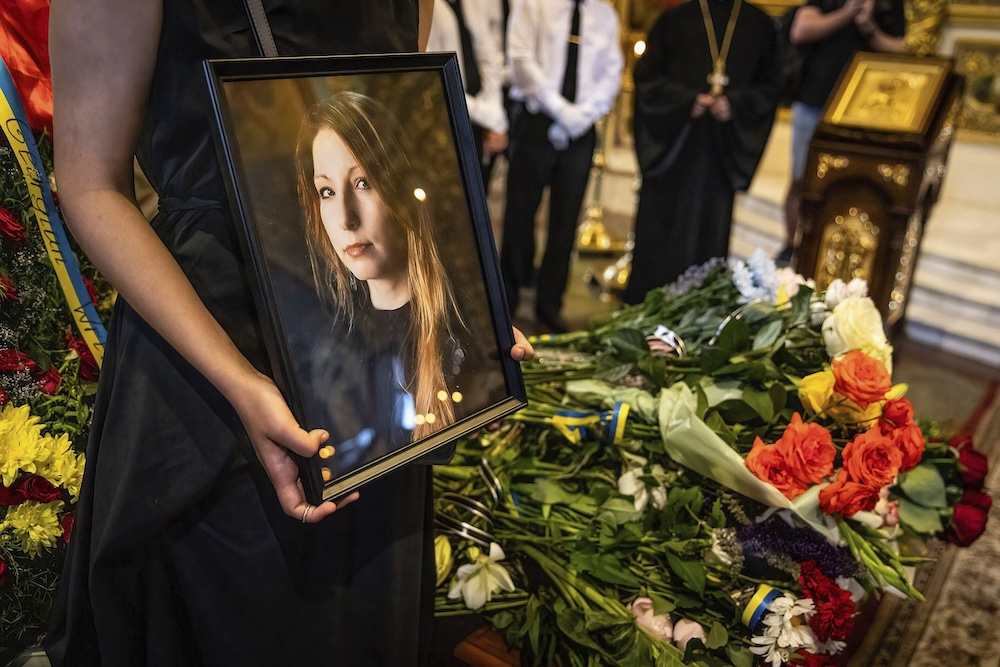The house has a small garden with a couple of flower beds and a more practical patch for planting potatoes. Fruit trees and berry bushes also are squeezed in somehow, belying how small the space is. A wooden bench under one of these trees offers much needed respite from the summer heat on those stifling afternoons when you want nothing more than to take a nap while the bees alone keep on working outside.
She never bought this dream house in Central Ukraine, for which she was searching with her husband right as the Russian invasion began on February 24, 2022. Instead, this young woman, whom we know only by her codename “Casanova” (appropriately describing her dream for the “casa nova” she didn’t get), organized a group of volunteers to research Russian war crimes in Ukrainian territories. It may be for the best. So many of these beautiful houses with their gardens—the dream homes of so many ordinary Ukrainians—have been destroyed over these past three years. Not all their residents survived. For some, like the murdered poet Volodymyr Vakulenko, the idyllic garden at the back of the house became a place to hide a diary of the war to ensure its survival.
One of the most famous literary descriptions of the contrast between war and peace is the tale of two cities, artistically engraved on the shield of Achilles in the Iliad, but art imitates life. In a city at peace, people engage in justice-arbitration proceedings, a marriage celebration is under way, and the agricultural cycle continues as it always has. In a city at war, however, terror rules. The people are under siege, watching the enemy close in as they anticipate a violent and horrific death.
Yet, in a city at war, people also yearn for justice even more than in a city at peace, believes Victoria Amelina. Her new book, Looking at Women, Looking at War, is the fruit of her own transformation in wartime from an award-winning Ukrainian novelist and poet into a war crimes researcher. Focusing specifically on extraordinary women, like Casanova, Amelina tells the stories of lawyers turned soldiers, museum directors turned protectors of Ukrainian cultural heritage, a village librarian turned war diarist, and so many women who simply did everything they could to help others in the midst of war—from outfitting bomb shelters with basic supplies before anyone else in their neighborhood even understood the need for these shelters, to interviewing witnesses and survivors of attacks and brutal torture.
***
The book proceeds in episodes, staccato-paced short stories of sorts, each titled after a particular woman through whose words, experiences, losses, and works of mercy Amelina documents some aspect of living in Ukraine in wartime. Visiting a librarian in the village of Kapytolivka, she describes an exchange about the land mine “in the ground of the school yard in front of the library marked with a red fire extinguisher, lying next to it on the ground.” The librarian casually instructs her driver to go around the mine, taking its existence for granted. When Amelina asks with concern if the kids at the school could accidentally step on it, the librarian assures her that everyone in the village knows to avoid the mine. War, we see, has reworked the local geography, creating its own new normal.
In another episode, we meet Evhenia Zakrevska, a lawyer who was prosecuting the crimes during the Maidan revolution and showed up at court yet again on the morning Putin’s tanks rolled over the border on February 24, 2022. Once she realized that court wouldn’t open that day, yet still eager to obtain justice, Zakrevska went directly to enlist in the Ukrainian army.
We also get to know more about the mysterious Casanova, who inspired Amelina to write this book in this form to begin with. Casanova had originally worked in a more official capacity as a war crimes researcher for Truth Hounds. Disappointed that years of research had failed to lead to a single hearing at the Hague, she decided to continue her work in a more independent capacity. Casanova’s team, including Amelina, ends up being the first to visit several villages that had been liberated after Russian occupation, leaving behind a devastation no less psychological than physical. The first rule, they discuss, is not to further traumatize the already traumatized survivors.
This book is no less Amelina’s own war diary as it is that of many others. Fittingly, she is also the one to recover Vakulenko’s war diary from his garden, digging with her own bare hands. Such is the work of preserving culture and literature, which she relates through story after story. It requires the commitments of ordinary women who have become extraordinary through their actions in this war. But did they even have a choice?
After all, if not for this war, Amelina would still be writing novels and children’s books and, perhaps, perfectly ordinary poetry. She would be putting her young son to bed herself, instead of sending him to Poland for safety in February 2022. She would be attending literary festivals and poetry readings, wearing those beautiful dresses she mentions relegating to the back of her closet as unfitting for wartime. War, she observes at one point, drains away the color from people and from objects, leaving nothing but the gray and black of shell holes, death, and destruction. Only the red fire hydrant marking the location of a land mine on the ground in an otherwise perfectly ordinary village provides color in this tableau.
And yet, hopeless and horrific as the war seems, investigating war crimes is a profoundly hopeful act. It assumes that the brutalities of the war right now—shell holes in kindergartens and hospitals, torture of ordinary villagers in basements with rigged telephone wires, mass rape and execution of civilians of all ages, destruction of cultural treasures, abduction of children—will be brought to light in the future. Perpetrators will be put on trial and there will be justice for victims and their families. Justice, after all, may be neglected in times of war. It is an essential feature of peace, however, as Homer describes. Or, in Amelina’s description of her mission in this book, “I’ve done this to uncover the truth, to ensure the survival of memory, and to give justice and lasting peace a chance.”
Such work raises difficult questions—one cannot do it and remain unchanged: “What is justice? Who are we ready to forgive eventually? How, meanwhile, can we live with the fact that perpetrators of the most horrible crimes often end up unpunished? How can we change that? And what weapon do we choose to pursue justice in the hardest times? A laptop, a camera, international law, storytelling power—or an M777 howitzer?”
These questions are even more pressing to us, the readers of Amelina’s book, for a reason she didn’t anticipate: Along with a number of other civilians, Amelina was critically wounded when two Russian missiles hit a popular pizzeria in Kramatorsk on June 27, 2023. She died of her injuries several days later. Her book was mostly finished at the time of her death, but some sections existed only in outline form or in notes—all of which the editors who put the manuscript together after her death chose to include. The effect is deeply moving as the book shifts from complete chapters and sections to the author’s work-in-progress notes, printed in gray to differentiate them from the black font of the final manuscript, bringing the reader into Amelina’s thought process in a more intimate way than we would have had she lived to complete and polish the book. We see her pursuit of justice and the recognition of the dignity of Ukrainians never separated from the pursuit of beauty. Such is the power of poetry and raw storytelling.
***
Toward the end of the book, Amelina describes listening to yet another air raid from the balcony of her Kyiv apartment, watching the air defense rockets respond to the attack unfolding in the city’s nighttime skies—so apocalyptic yet ordinary. “I just don’t fear death anymore,” she observes. “I imagine even how all the women I write about would finally gather at my funeral: they all are busy fighting for justice, so such an occasion is definitely the only chance. But then I remember I have yet to finish this book, watch my son grow up, and possibly even join the army in several years. So I step away from the magnificent but dangerous view and get back to writing.”
In her book Women and War, philosopher Jean Bethke Elshtain considered the civic virtues that war can foster in both men and women. Reading Amelina’s book, I kept thinking of the power of writing and of words as virtuous weapons—in this case, hauntingly, a weapon that will work after its maker’s death.
Left pinned on Amelina’s Twitter/X profile at the time of her death is a photo someone took of her in action at her request. Elegantly dressed in a black dress that looks casually professional and mournful all at once, she is photographing an apartment building that had been struck by missiles. Her caption for this post: “It’s me in this picture. I’m a Ukrainian writer. I have portraits of great Ukrainian poets on my bag. I look like I should be taking pictures of books, art, and my little son. But I document Russia’s war crimes and listen to the sound of shelling, not poems. Why?

